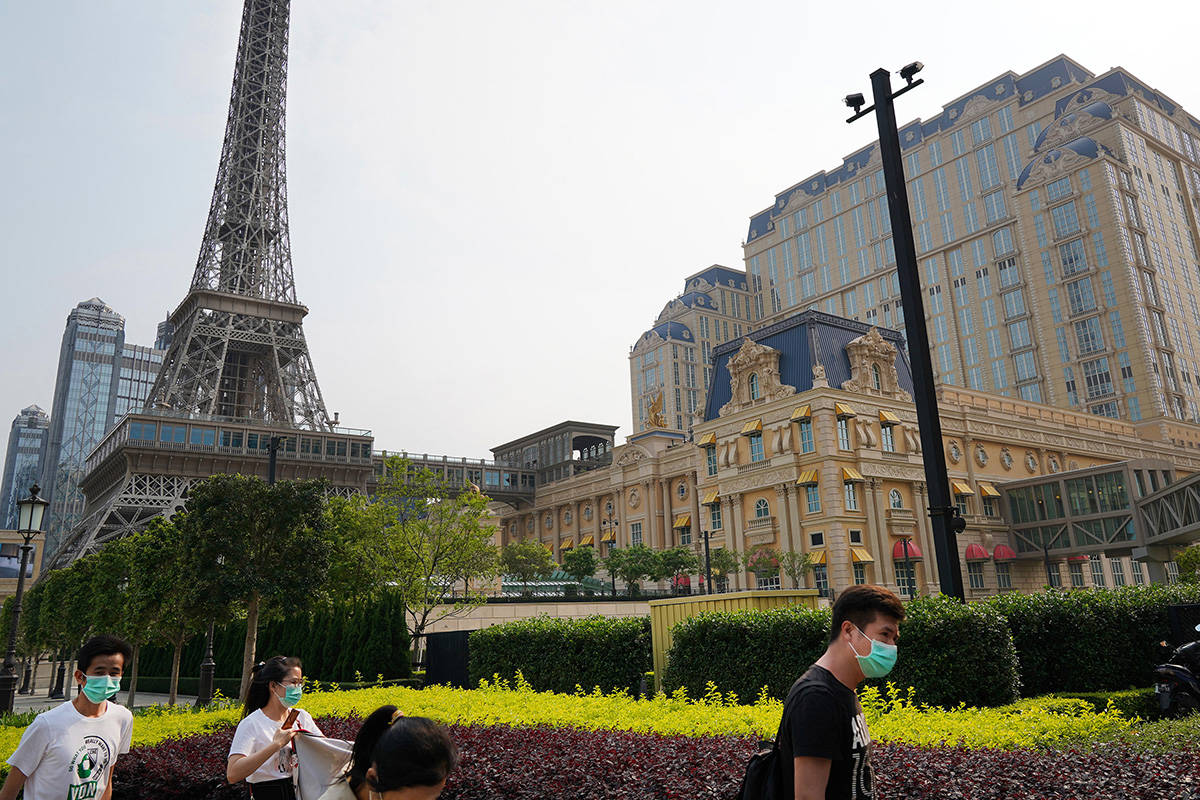Macao casino revenue down in May; Sands issues reduced profits warning
Casinos in Macao reported more revenue declines in May, prompting Las Vegas Sands Corp. to warn investors of lower profits.
In a Securities and Exchange Commission filing Monday, Sands reported that it “believes it has a strong balance sheet and sufficient liquidity in place to fund its operations for 12 months in the current operating environment.”
Macao’s Gaming Inspection and Coordination Bureau on Monday reported a 93.2 percent decline in monthly gross revenue in May from a year ago. The bureau reported revenue of $221 million, compared with $3.252 billion a year ago in May. It was the eighth straight month of declines in that market.
For the first five months of 2020, Macao casinos generated $4.135 billion, compared with $15.749 billion in the first five months of 2019, a 73.7 percent decline.
In 2019, Macao’s casinos showed a 3.4 percent decrease in revenue from the previous year, to $36.644 billion. Macao had its best year in 2013, when casinos generated $45.2 billion.
But 2020 has been a different story.
In February, Macao’s government ordered a 15-day closure of the area’s casinos to slow the spread of the COVID-19 virus. In March, border crossings into Macao from mainland China were closed as another containment measure. Borders have yet to reopen.
In April, visitation to Macao was down 99.6 percent from a year earlier, according to the government.
The special administrative district, home to casinos operated by three Las Vegas-based companies — Sands, MGM Resorts International and Wynn Resorts Ltd. — has another prospective issue on the horizon with escalating political tensions surrounding the status of nearby Hong Kong.
The Chinese central government has initiated plans to allow extradition from Hong Kong to mainland China, a move that critics fear would undermine Hong Kong’s judicial independence in what has been a “one country, two systems” arrangement that has existed since 1997.
Macao’s deepening financial downturn prompted Sands’ SEC filing.
“The duration and intensity of this global health emergency and related disruptions are uncertain,” the filing states. “Given the dynamic nature of these circumstances, the impact on (Sands’) consolidated results of operations, cash flows and financial condition in 2020 will be material. (Sands) cannot reasonably estimate the impact at this time. It is unknown when the COVID-19 pandemic will end, when or how quickly the current travel restrictions will be modified or cease to be necessary and the resulting impact on the willingness of (Sands’) customers to spend on travel and entertainment.”
The company said that it had taken “various mitigating measures to manage through the current environment, including a cost reduction program to minimize cash outflow of nonessential items.”
The company said that on April 17, its board of directors voted not to pay a final dividend for the end of 2019.
The filing also had a chart showing adjusted property cash flow of $67 million for the first three months of 2020, compared with $858 million a year earlier, and minus $105 million for the month of April, compared with $239 million in April 2019.
Company spokesman Ron Reese declined additional comment beyond the SEC filing.
Las Vegas Sands shares were up $1.09, 2.3 percent, to $49.03 a share in moderate trading volume on the New York Stock Exchange Monday. After hours, the stock dipped 46 cents, 0.9 percent, to $48.57 a share.
The Review-Journal is owned by the family of Las Vegas Sands Corp. Chairman and CEO Sheldon Adelson. Las Vegas Sands operates six properties in Macao and one in Singapore as well as The Venetian, Palazzo and the Sands Expo and Convention Center in Las Vegas.
Contact Richard N. Velotta at rvelotta@reviewjournal.com or 702-477-3893. Follow @RickVelotta on Twitter.

















































